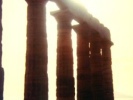
Sacred Texts Classics Index Previous Next
Buy this Book at Amazon.com


Fragments that Remain of the Lost Writings of Proclus, by Thomas Taylor, [1825], at sacred-texts.com
The paradigm of the world is eternal; and his existence, as a paradigm, is that which is essential, and not accidental to him. But because he possesses the power of being a paradigm essentially, hence, as * he is eternal, he will be eternally the paradigm of the world. If, however, an existence eternally is present with the paradigm, the image also will necessarily always exist; for a paradigm is a paradigm with reference to an image. But if the image was not when the paradigm was not, neither will the paradigm be when the image is not; † since, in this case, it will no longer be a paradigm. For either it will not be a paradigm if the image is not, or it will not be the paradigm of the image. Of things, therefore, which are predicated with reference to each other, the one cannot exist if the other is not. Hence, if the paradigm of the world is eternally the paradigm of it, the world always is an image of an eternally existing paradigm.
36:* For διατι, in the original, it is necessary to read διοτι.
36:† Because the paradigm here is essentially a paradigm, so as not to exist without being a paradigm.